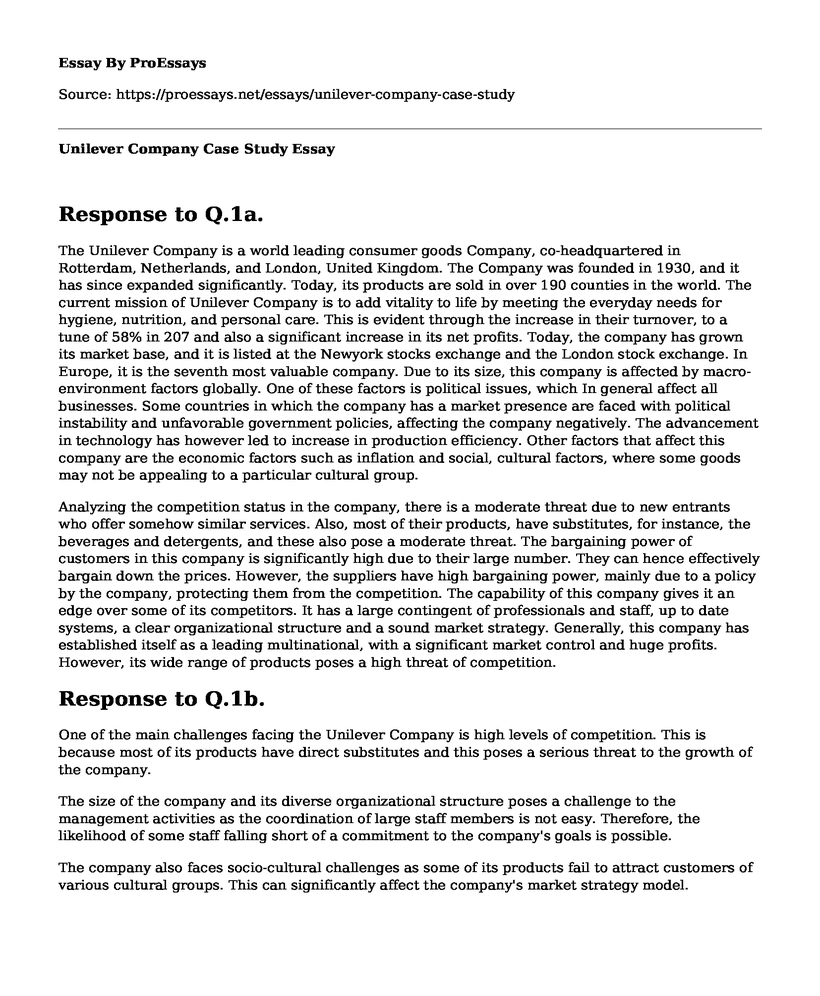Response to Q.1a.
The Unilever Company is a world leading consumer goods Company, co-headquartered in Rotterdam, Netherlands, and London, United Kingdom. The Company was founded in 1930, and it has since expanded significantly. Today, its products are sold in over 190 counties in the world. The current mission of Unilever Company is to add vitality to life by meeting the everyday needs for hygiene, nutrition, and personal care. This is evident through the increase in their turnover, to a tune of 58% in 207 and also a significant increase in its net profits. Today, the company has grown its market base, and it is listed at the Newyork stocks exchange and the London stock exchange. In Europe, it is the seventh most valuable company. Due to its size, this company is affected by macro-environment factors globally. One of these factors is political issues, which In general affect all businesses. Some countries in which the company has a market presence are faced with political instability and unfavorable government policies, affecting the company negatively. The advancement in technology has however led to increase in production efficiency. Other factors that affect this company are the economic factors such as inflation and social, cultural factors, where some goods may not be appealing to a particular cultural group.
Analyzing the competition status in the company, there is a moderate threat due to new entrants who offer somehow similar services. Also, most of their products, have substitutes, for instance, the beverages and detergents, and these also pose a moderate threat. The bargaining power of customers in this company is significantly high due to their large number. They can hence effectively bargain down the prices. However, the suppliers have high bargaining power, mainly due to a policy by the company, protecting them from the competition. The capability of this company gives it an edge over some of its competitors. It has a large contingent of professionals and staff, up to date systems, a clear organizational structure and a sound market strategy. Generally, this company has established itself as a leading multinational, with a significant market control and huge profits. However, its wide range of products poses a high threat of competition.
Response to Q.1b.
One of the main challenges facing the Unilever Company is high levels of competition. This is because most of its products have direct substitutes and this poses a serious threat to the growth of the company.
The size of the company and its diverse organizational structure poses a challenge to the management activities as the coordination of large staff members is not easy. Therefore, the likelihood of some staff falling short of a commitment to the company's goals is possible.
The company also faces socio-cultural challenges as some of its products fail to attract customers of various cultural groups. This can significantly affect the company's market strategy model.
Response to Q.2a.
The issues of substitute goods is of great significance if the marketing strategy of the company is to succeed. Intensive competition from companies offering similar goods to some which the company offers may lead to a substantial decline in profits and a subsequent collapse of some lines of production in the company. However, the company has options such as product differentiation and also considering the production of new and better quality goods. These two options have been studied and proven to yield wonderful results in warding off competition from other firms. However, the product differentiation option is a more viable option.
Response to Q.2b.
Product differentiation requires that the company undertakes detailed market research to understand the consumer preferences. Intensive market research and the company innovation will help identify the best ways to make products that woo the customers. This option is the best option as it requires less hiring of new staff and demands more of additional training to the existing staff. A properly conducted market research will help the company's products compete favorably with similar of substitute products in the market...
Cite this page
Unilever Company Case Study. (2022, May 26). Retrieved from https://proessays.net/essays/unilever-company-case-study
If you are the original author of this essay and no longer wish to have it published on the ProEssays website, please click below to request its removal:
- Inventory Tracking Method in a Company and Its Contribution to Success of the Business
- Managing Classroom Challenges Paper Example
- Paper Example on Success of Amazon
- Local Content in Petroleum Producing Economies Paper Example
- Essay Sample on Manpower Selection: Crucial for Project Success
- Global Business: Impact of Multinational Enterprises - Essay Sample
- Essay on Communication Evolved: Exploring the Impact of Technology on Advertisements







